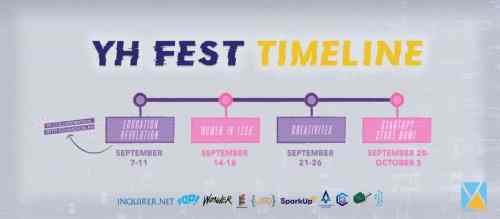YouthHack Fest 2020 is behind us—but not really
The roads, malls and restaurants may have opened up in the last few weeks, but schools and students are still getting the hang of online learning. The entire process isn’t easy, especially when we’ve all gotten used to the traditional practice of education on-ground. But the flexibility we’ve seen and the methods that have since arisen are simply proof that there is no stopping education.
And education, likewise, can come from anyone and can be about anything.
RELATED: YouthHack Fest 2020 & The Four Pillars You Need In Your Life (This Month And Beyond)
Last month, YouthHack Manila opened up online for YouthHack Fest 2020, which centered on four pillars: Education Revolution, Women In Tech, Creativitea and Start Up? Start Now!—not exactly topics you would find in a traditional curriculum, but this year is all about expanding what we understand to be “normal.”
Below are just some of the stronger lessons we learned in that month.
Education Revolution
Education does not and has not ever come in a one-size-fits-all situation. There are eight intelligences widely encouraged right now:
- Visual Intelligence: learn best through visual aids and are better at seeing the bigger picture rather than smaller details
- Oral Intelligence: respond well to speech, retain verbal information and can follow spoken instructions
- Logical Intelligence: work well within structures, particular numbers, problem solving, reasoning and abstract information
- Naturalistic Intelligence: comfortable with elements and patterns in the natural world
- Verbal Intelligence: gather information best through reading and writing
- Physical Intelligence: learn best when they use their body and its movements
- Interpersonal Intelligence: are social people and learn more efficiently with others around them
- Intrapersonal Intelligence: are best and most effective when they study on their own
All that said, it isn’t enough that we’re able to distinguish which our intelligence specifically is; what’s important is that we match the ways we study to them. If you’re of the Oral Intelligence, invest in audio books instead of physical ones; if you have Interpersonal Intelligence, find others like you and form study groups—it’s a mix and match situation where you need to find what works best for you.
And some tips on how to use technology to deepen your understanding of your lessons? Our favorite is to make sure the some of the time you spend online is productive and conscious (read: avoid the black holes).
RELATED: What Is “Doomscrolling” And How Do You Stop It From Harming Your Mental Health?
Women In Tech
Reina Reyes, an associate professor at the National Institute of Physics in UP Diliman taught us that curiosity is a great and powerful thing. It can start you on a path you never considered, but curiosity should also be the driving force behind your passion. Education, essentially, never stops—so neither should your learning or understanding.
On the other hand, Gina Romero, the co-founder and CEO of Connected Women Jobs (a tech startup that matches Filipino women with remote work opportunities), taught us the importance of connection and reconnection. Sometimes, today’s challenges make us forget the big picture or why we started in the first place. The answer to that? It’s the reason why you started in the first place.
Creativitea
On the offset, people might think that art and tech have no space to mingle. You have something that’s seemingly abstract and another that is clearly technical—how can the two ever marry?
But if you think about it, the two actually play a big role in each other’s advances; it’s called Design Thinking, of which there are five steps. First, you need to empathize and ask how you are to approach the challenge. Afterwards, you define and interpret your feelings, as well as ideate ways to create and approach the challenge. Then comes the technical side, in which you are to create a prototype to help build your idea. The last step is to test and test and test, because there will always be room for improvement.
Start Up? Start Now!
Startups are all the rage, especially with everyone putting on their entrepreneurial hats on. But plenty of startups never make it past the big hump. While plenty of speakers joined in on this year’s YouthHack Fest 2020, there was one core mistake the speakers in the Start Up? Start Now! week agreed on: miscommunication leads to failure.
Most startups fail when those initially involved aren’t speaking to each other properly, jump on the hype and eventually have misunderstandings. When one founder is no longer happy or a partner doesn’t feel like the goals are being met in the best way, then things may fall apart.
Start your startup as soon as you can, but make sure that everyone aboard is on the same ship.
RELATED: Everything Your Medical Professional Wants You to Know About Self-Care in a Health Crisis
I grew up in a traditional school with traditional values, traditional curriculums and traditional practices. But we all need to learn to be a little more flexible when it comes to obtaining information—and what kind of information we’re taking in. Be open, don’t close those doors and take everything good that’s handed to you.
Follow YouthHack Manila for more on Facebook.
Art Matthew Ian Fetalver



















